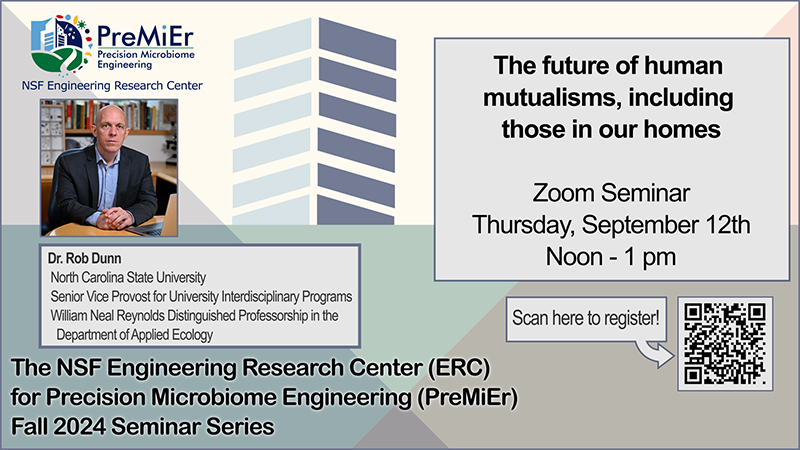
- This event has passed.
Rob Dunn – The future of human mutualisms, including those in our homes | PreMiEr Seminar Series

PreMiEr Fall 2024 Seminar Series | Dr. Rob Dunn
September 12 @ 12:00 PM – 1:00 PM
The NSF Engineering Research Center for Precision Microbiome Engineering (PreMiEr) invites you to the next installment of the PreMiEr Fall 2024 Seminar Series on September 12th from Noon to 1pm on Zoom.
Dr. Rob Dunn
Senior Vice Provost for University Interdisciplinary Programs
William Neal Reynolds Distinguished Professor in the Department of Applied Ecology
North Carolina State University
The future of human mutualisms, including those in our homes
For ecologists and evolutionary biologists, mutualisms are mutually beneficial relationships between or among species. For most of prehistory and parts of history, these mutualisms have been measured, tacitly, in terms of the fitness benefits to each partner. That is, does each partner have more children that survive to reproduce than in what when going it alone. Obviously, in our modern contexts, this is no longer the metric we seek to use. But what then? How do we judge our relationships? Dunn asks this question while also highlighting the extent to which non-human species have often been as much in control of human mutualisms as have humans. This is true for human-honeyguide as well as human-dolphin and human-whale mutualisms. It is arguably the case for history human-yeast-grain mutualisms. Dunn concludes the talk by turning back to daily, indoor lives in which mutualisms still abound but, intriguingly, are controlled as much by tacit aspects of traditional knowledge (this is how one makes sourdough bread) and subconscious decisions as they are by conscious decisions. What does and should this mean with regard to how we engineer new mutualisms in our homes? Dunn does not answer this question. In fact, he answers none of the questions he poses but instead opens them up for discussion, after the talk, but, also, over the next decade or so.
This series is open to the public, but non-PreMiEr members must register to receive the Zoom link. You need register only once for the entire series.
Register at https://duke.qualtrics.com/jfe/form/SV_0Pzn6Zv6XjNwKlE
WordPress database error: [Unknown column 'wp_tec_occurrences.start_date' in 'SELECT']SELECT SQL_CALC_FOUND_ROWS wp_posts.*, CAST( wp_tec_occurrences.start_date AS DATETIME ) AS event_date
FROM wp_posts LEFT JOIN wp_term_relationships ON (wp_posts.ID = wp_term_relationships.object_id) LEFT JOIN wp_postmeta ON ( wp_posts.ID = wp_postmeta.post_id AND wp_postmeta.meta_key = '_EventHideFromUpcoming' ) LEFT JOIN wp_postmeta AS mt1 ON ( wp_posts.ID = mt1.post_id )
WHERE 1=1 AND wp_posts.ID NOT IN (20490) AND (
wp_term_relationships.term_taxonomy_id IN (910)
OR
wp_term_relationships.term_taxonomy_id IN (926)
) AND (
wp_postmeta.post_id IS NULL
AND
( mt1.meta_key = '_EventStartDate' AND CAST(mt1.meta_value AS DATETIME) >= '2026-03-05 09:23:55' )
) AND wp_posts.post_type IN ('post', 'page', 'attachment', 'tribe_venue', 'tribe_events', 'tribe_event_series') AND ((wp_posts.post_status = 'publish'))
GROUP BY wp_tec_occurrences.occurrence_id
ORDER BY event_date ASC, wp_posts.post_date ASC
LIMIT 0, 3